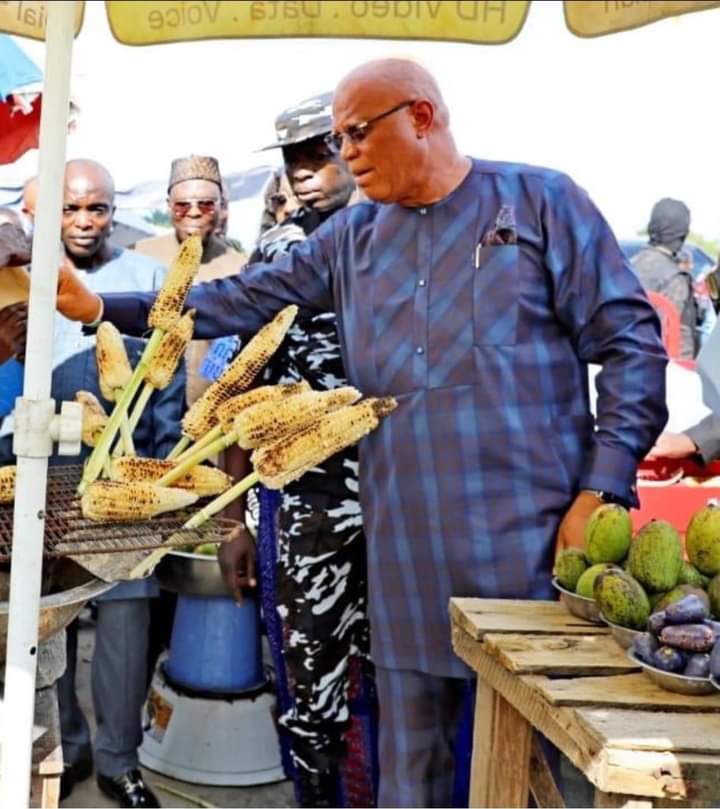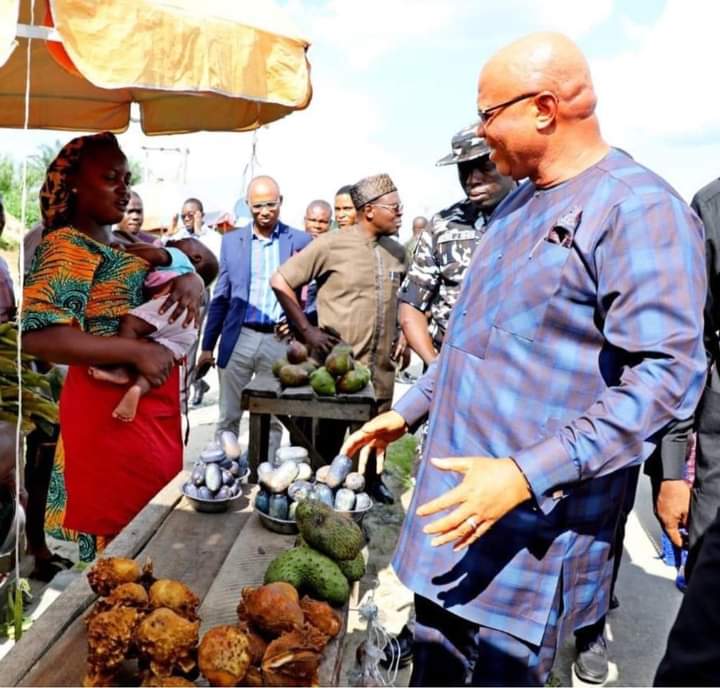Chairman, Akwa Ibom Tourism and Hospitality Practitioners’ Association (AKTHOPA), an indigenous self-regulated association founded by Pastor Umo Bassey Eno, to regulate tourism and hospitality businesses, Mr Usen Udoh has lauded the governor for his pro-poor tourism actions since assuming office.
Mr. Udoh who made the commendation while speaking with newsmen in Uyo on Wednesday also urged policymakers to formulate pro-poor tourism policies that would directly target the poor people, with a view to reducing poverty in line with the United Nations Sustainable Development Goals (SDGs).
He said Pastor Umo Eno”s spontaneous visits to roadside petty traders and market women to encourage them from time to time, was a step in the right direction, explaining that the United Nations emphasizes the need to maximize the potential of tourism in reducing poverty.
Mr. Udoh disclosed that Pro-poor tourism which was first introduced into the tourism literature in 1999, as a poverty reduction strategy was defined as tourism that provides net benefits for the poor, informing that pro-poor tourism policies allow poor people to be directly involved in the policy making processes which by nature and structure lead to pro-poor outcomes.

“Pro-poor tourism, often referred to as a model of tourism that generates net benefits for the poor dates back to the early 2000s (with the term first being coined in 1999) and was presented as an initiative to utilise funds generated through tourism, to help the world’s poorest people. So, pro-poor tourism remains a fantastic example of how tourism can be used as a force for good, “he explained.
Mr. Udoh, the pioneer chairman of the Federation of Tourism Associations of Nigeria (FTAN) in Akwa Ibom State and Managing Director/CEO of Legacy Tourism Development Services Ltd, a notable hospitality brand in Uyo, further noted that: “Strategically, pro-poor tourism aims to ‘increase economic stability and mitigate the negative effects of local cultures and environments”.
According to the AKTHOPA chairman: “There are three strategies a state adopt to achieve success with pro-poor tourism initiatives, including increasing financial profits of poor people, enriching the lives of local people, as well as encouraging collaboration with the poor in communities”.
He said pro-poor tourism initiatives are aimed at improving rural livelihoods through revenue that the tourism industry brings, saying that though it is not quite as simple as it sounds, it calls for careful management of the economic impacts of tourism and hospitality.
The managing director pointed out that the aim of pro-poor policies is to improve the assets and capabilities of the poor, informing that Pastor Umo Eno’s spontaneous and unannounced visits to local markets and roadside petty traders to purchase fresh roasted corns gives him the advantage of doing on-the-spot evaluation of the conditions they face in their businesses.
He noted further that the governor’s empathy for the downtrodden prompts him to always identify with the poor in a bid to encourage and promote local occupational opportunities with a view to developing small and medium enterprises to be able to effectively and effectively provide products in the tourism and hospitality value chain.
Mr. Udoh reiterated that pro-poor tourism initiatives also provide the locals access to facilities and services originally established for tourists, a strategy, he said is meant to enrich the lives of native citizens of a destination, pointing out that tourism can bring wealth and jobs to communities that would have otherwise remained in poverty, as much as it can also lead to social dislocation, loss of cultural heritage and ecological degradation if not properly planned.
“Tourism offers great opportunities for emerging economies and developing countries. It creates jobs, strengthens the local economy, contributes to local infrastructure development and can help to conserve the natural environment and cultural assets and traditions, and reduce poverty and inequality in the land.
“There are several benefits of tourism on host destinations. Tourism boosts the revenue of the economy, creates thousands of jobs, develops the infrastructures of a country, and plants a sense of cultural exchange between foreigners and citizens.
“When one person comes out of poverty, thanks to pro-poor tourism, it creates a knock on effect. They are able to help others and advise their community. Success builds success, and the opportunities coming out of this concept are life changing for many.
“The benefits of pro-poor tourism don’t stop there. If we think about applying this to our own travels, it encourages us to be a bit more considerate. Rather than choosing a chain restaurant, perhaps we might choose a small family-run business for dinner.
“This way, the profits are going straight back into the local community. Being a pro-poor tourist means thinking carefully about where your money is going and how much of it is being used to help people in poverty. It can be less convenient, but it feels much better to know that your tourist dollars are supporting poor people, “the AKTHOPA chairman asserted.
Recall that pro-poor growth is a term used primarily for policies that stimulate economic growth for the benefit of poor people in the economic sense of poverty.
The United Nations World Tourism Organization (UNWTO) further adds that tourism can be an effective catalyst for poverty reduction because it offers host communities unlimited opportunities to sell goods and services, to diversify and supplement their sources of income, provide employment opportunities for local people, especially women, promote gender equality and stimulate local economic growth.



